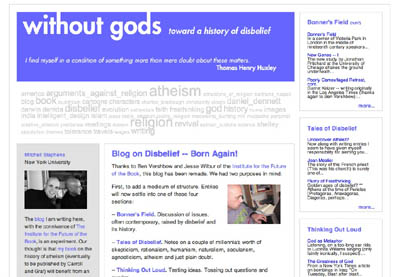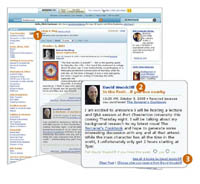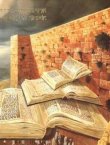Unrest in the Middle East. Cartoons circulated and Danish flags set ablaze (who knew there were so many Danish flags?) A high-profile debate in the pages of the New York Times between a prominent atheist and a Judeo-Christian humanist. Another setback for the “intelligent design” folks, this time in Utah. Things have been busy of late. The world rife with conflict: belief and disbelief, secular pluralism and religious extremism, faith and reason, and all the hazy territory in between.
Mitchell Stephens, too, has been busy, grappling with all the above on Without Gods while trying to muster the opening chapters of his book — the blog serving as both helper and hindrance to his process (a fascinating paradox that haunts the book in the network). To reflect these busy times — and Mitch’s busy mind — the blog has undergone slight renovation, reflecting the busier layout of a newspaper while hopefully remaining accessible and easy to read.

There’s a tag cloud near the top serving as a sort of snapshot of Mitch’s themes and characters, while four topic areas to the side give the reader more options for navigating the site. In some ways the new design also reminds me of the clutter of a writer’s desk — a method-infused madness.
As templates were updated and wrinkles ironed out in the code, Mitch posted a few reflections on the pluses and pitfalls of this infant form, the blog:
Newspapers, too, began, in the 17th century, by simply placing short items in columns (in this case from top down). So it was possible to read on page four of a newspaper in England in 1655 that Cardinal Carassa is one of six men with a chance to become the next pope and then read on page nine of the same paper that Carassa “is newly dead.” Won’t we soon be getting similar chuckles out of these early blogs — where leads are routinely buried under supporting paragraphs; where whim is privileged, coherence discouraged; where the newly dead may be resurrected as one scrolls down.
Early newspapers eventually discovered the joys of what journalism’s first editor called a “continued relation.” Later they discovered layout.
Blogs have a lot of discovering ahead of them.




